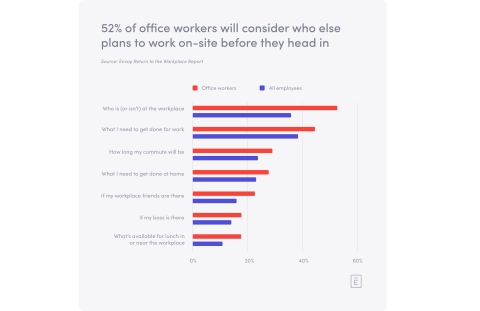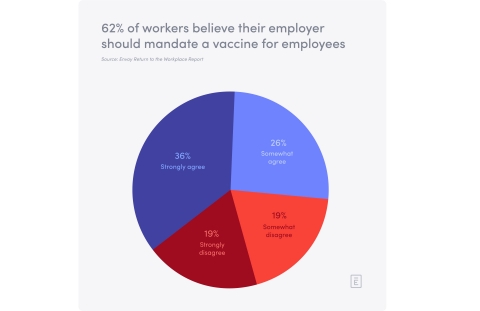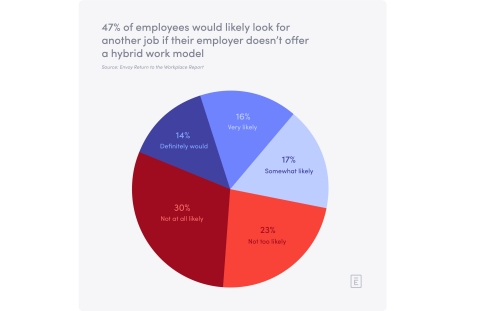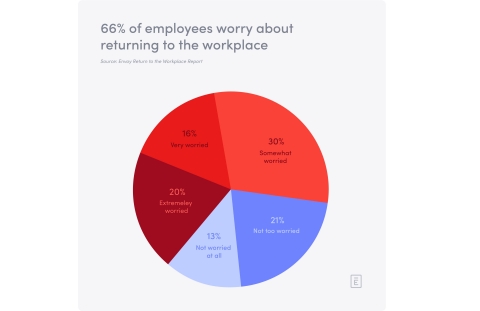As Workplace Returns Accelerate, New Study Finds Employees Want Companies to Embrace Hybrid Work and Enforce Mandatory COVID Vaccines
Majority of employees fear workplaces will relax COVID measures too soon, risking health and safety
Envoy, maker of the workplace technology platform, released results from its new Return to the Workplace Report, which examines employee attitudes on office returns a year after the pandemic caused widespread remote work. The study finds a majority of employees remain concerned about the health and safety risks posed by a return to the office, with 62% supporting a mandatory COVID vaccine requirement for a return to on-site work and 61% fearing their employers may relax COVID measures too soon. Still, nearly half say they prefer to return to a hybrid work model combining both remote and in-person work, with office workers citing an average of 3.3 days as the ideal number to work at the office. The report comes as many companies are planning how and when employees will return to a post-pandemic workplace.
HR Technology News: Employee Experience And Usability Key To HR Technology Stack’s Success In 2021




“The data shows us that employees do want to return to the workplace, but in a way that prioritizes their need for flexibility and recognizes the pandemic’s impact on the way we work now. Many employees want the power to design a workweek that works best for them, which companies can support by embracing a hybrid work model,” said Envoy founder and CEO Larry Gadea. “Supporting employees to do their best work will look different at every company—our intention is to make it easy for companies to transition back no matter what approach they choose. In any scenario, companies will need insights, strategies, and technologies that enable them to craft a workplace experience where employees can thrive.”
HR Technology News: COPC Inc. announces RevealCX as new Approved Technology Provider
Key report findings:
- Employees remain concerned about returning to the workplace, especially younger workers and people of color
- A majority (66%) of employees say they are worried for their health and safety when it comes to returning to the workplace.
- Concerns are even more pronounced among people of color (78%) and Gen Z (under age 25) employees (75%) who fear a return to the workplace could compromise their health and safety.
- A majority of employees fear their companies won’t adequately protect their health, with 61% worried their workplace will relax COVID measures too early.
- A majority of employees want mandatory vaccines in order to return to the workplace
- A majority (62%) of employees believe companies should require workers to get a COVID vaccine before they are permitted to go back to the office in person.
- That sentiment is even stronger among technology and business services sector employees, with 76% saying vaccines should be mandatory for any employee who wishes to return to the workplace.
- Hybrid work is a priority for many employees
- Nearly half of respondents (48%) would like to work some days remotely and some days from the office. That sentiment is even stronger among people of color, with 59% expressing a preference for a hybrid work arrangement.
- Many workers (41%) say they would be willing to take a job with a slightly lower salary if their company offered them a hybrid work model, while 47% of employees say they would likely leave their job if it didn’t offer a hybrid work model post-pandemic.
- Interest in hybrid work is growing in industries that typically require on-site work. Workers in healthcare (61%), construction/manufacturing (41%) and retail and hospitality (34%) say they would prefer to work in a hybrid model.
- More than half (56%) of employees believe a hybrid work model would impact them positively, with the top benefits being less time and money spent commuting (38%), better work/life balance (34%) and improved work performance (21%).
- Employees want to return to workplaces together
- If given a choice to work from home or the office, the top factors that influence an employee’s decision include what they need to get done for work (39%) and who else plans to be at the workplace that day (37%), indicating that some work is better suited for a collaborative environment.
- The desire to know who else will work on-site each day is especially strong for office workers: 52% said that their co-workers’ workplace schedules will influence their own.
- For office workers, friends are a stronger pull to the workplace than a boss or supervisor, with 23% of employees saying they would work from the office in order to see friends, compared to 18% who would go in to secure face time with their boss.
As vaccine rollouts progress and a return to the workplace nears, the data shows employees remain concerned about their health and safety and are interested embracing new ways of working, including a hybrid work model. Companies face many considerations when it comes to designing the post-pandemic workplace—from prioritizing employee health to adopting flexible work models to enhancing collaboration and creativity.
HR Technology News: EBI Partners with KINEXON for Leading Distance Monitoring & Contact Tracing Solution

